Lung Cancer Treatment Cost in India from top hospitals starts from INR 706775 (USD 8500)approx
.Lung cancer is cancer when it spreads across the Lung and damages the tissues around that region. Lung Cancer can be divided into two parts: small cell and non-small cell. Lung cancer treatment is often combined with chemotherapy treatments but may also include radiation therapy and surgery if required.
Medical tourism is a growing sector in India, with tourists coming from across the globe to get various types of medical facilities. The main magnetism for medical tourists coming to India is the quality of health care, which is available at affordable prices, with no waitlist. Most of the Indian doctors are famed throughout the world for their commitment and skills. The majority of the hospitals in India are offering international facilities with cutting-edge diagnostic methods and advanced technology for all types of oncology procedures.
American Oncology Institute, Hyderabad
VPS Lakeshore, Cochin
HCG Hospital, Bangalore
Seven Hills Hospital, Mumbai
The cost of lung cancer in India along with the excellence of treatment and aftercare provided are comparable with few of the most popular medical tourism destinations like Singapore, Turkey, and Hungary. Lung cancer surgery cost in India along with the chemotherapy and radiation, accommodation is almost less than one-sixth when compared with the treatment cost offered in the
| Country | Cost | Local_currency |
|---|---|---|
| Greece | USD 25000 | Greece 23000 |
| India | USD 8500 | India 706775 |
| Israel | USD 20000 | Israel 76000 |
| Lebanon | USD 25000 | Lebanon 375138750 |
| Malaysia | USD 13800 | Malaysia 64998 |
| South Korea | USD 13000 | South Korea 17454970 |
| Spain | USD 32000 | Spain 29440 |
| Switzerland | USD 25000 | Switzerland 21500 |
| Thailand | USD 28000 | Thailand 998200 |
| Tunisia | USD 25000 | Tunisia 77750 |
| Turkey | USD 10770 | Turkey 324608 |
| United Arab Emirates | USD 25000 | United Arab Emirates 91750 |
| United Kingdom | USD 25000 | United Kingdom 19750 |
Treatment cost
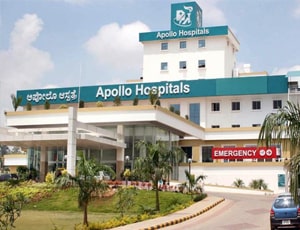
Types of Lung Cancer Treatment in Apollo Hospitals Bannerghatta and its associated cost
| Treatment Option | Approximate Cost Range (USD) | Approximate Cost Range (INR) |
|---|---|---|
| Lung Cancer Treatment (Overall) | 6707 - 8964 | 557863 - 727658 |
| Surgery | 4497 - 7753 | 366249 - 636940 |
| Lobectomy | 1696 - 6660 | 135406 - 554600 |
| Pneumonectomy | 2283 - 9097 | 186044 - 736683 |
| Segmentectomy | 1700 - 5739 | 137987 - 456963 |
| Chemotherapy | 911 - 2220 | 74447 - 184294 |
| Targeted Therapy | 1146 - 3408 | 93264 - 274316 |
| Immunotherapy | 1678 - 3926 | 138390 - 327400 |
| Radiation Therapy | 2261 - 5117 | 183945 - 424093 |
| Palliative Care | 568 - 1663 | 45246 - 139341 |
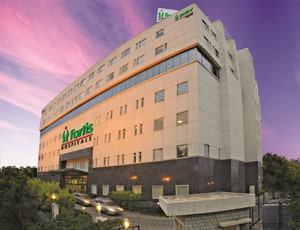
Types of Lung Cancer Treatment in Fortis Hospital and its associated cost
| Treatment Option | Approximate Cost Range (USD) | Approximate Cost Range (INR) |
|---|---|---|
| Lung Cancer Treatment (Overall) | 6067 - 8132 | 499340 - 668760 |
| Surgery | 4067 - 7076 | 333307 - 579931 |
| Lobectomy | 1530 - 6072 | 124989 - 498443 |
| Pneumonectomy | 2040 - 8108 | 165741 - 667737 |
| Segmentectomy | 1530 - 5096 | 125436 - 417622 |
| Chemotherapy | 812 - 2031 | 66290 - 166424 |
| Targeted Therapy | 1012 - 3036 | 83341 - 250527 |
| Immunotherapy | 1519 - 3542 | 124709 - 291913 |
| Radiation Therapy | 2023 - 4563 | 165869 - 376216 |
| Palliative Care | 507 - 1525 | 41618 - 124455 |
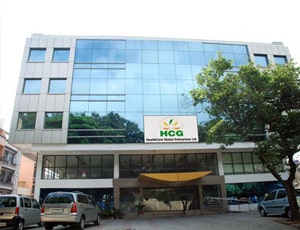
Types of Lung Cancer Treatment in HCG Kalinga Rao Road and its associated cost
| Treatment Option | Approximate Cost Range (USD) | Approximate Cost Range (INR) |
|---|---|---|
| Lung Cancer Treatment (Overall) | 6065 - 8097 | 499290 - 665468 |
| Surgery | 4065 - 7138 | 332609 - 582149 |
| Lobectomy | 1517 - 6091 | 124257 - 499223 |
| Pneumonectomy | 2026 - 8152 | 166786 - 668586 |
| Segmentectomy | 1524 - 5087 | 125335 - 417100 |
| Chemotherapy | 811 - 2029 | 66679 - 166941 |
| Targeted Therapy | 1013 - 3048 | 83278 - 248595 |
| Immunotherapy | 1523 - 3554 | 124835 - 290202 |
| Radiation Therapy | 2038 - 4557 | 166164 - 374895 |
| Palliative Care | 506 - 1515 | 41555 - 125286 |


Types of Lung Cancer Treatment in Sarvodaya Hospital and Research Centre and its associated cost
| Treatment Option | Approximate Cost Range (USD) | Approximate Cost Range (INR) |
|---|---|---|
| Lung Cancer Treatment (Overall) | 6094 - 8106 | 501189 - 667725 |
| Surgery | 4066 - 7104 | 332184 - 581279 |
| Lobectomy | 1526 - 6065 | 124391 - 500031 |
| Pneumonectomy | 2023 - 8124 | 165903 - 668777 |
| Segmentectomy | 1515 - 5083 | 125021 - 418010 |
| Chemotherapy | 815 - 2036 | 66688 - 166423 |
| Targeted Therapy | 1013 - 3043 | 83570 - 250767 |
| Immunotherapy | 1518 - 3567 | 124461 - 292533 |
| Radiation Therapy | 2028 - 4587 | 165933 - 373096 |
| Palliative Care | 505 - 1529 | 41506 - 124884 |
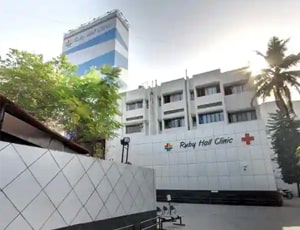
Types of Lung Cancer Treatment in Ruby Hall Clinic and its associated cost
| Treatment Option | Approximate Cost Range (USD) | Approximate Cost Range (INR) |
|---|---|---|
| Lung Cancer Treatment (Overall) | 5680 - 7559 | 463075 - 608551 |
| Surgery | 3790 - 6578 | 304372 - 536188 |
| Lobectomy | 1382 - 5531 | 114840 - 454780 |
| Pneumonectomy | 1872 - 7371 | 152068 - 614857 |
| Segmentectomy | 1399 - 4645 | 115854 - 387597 |
| Chemotherapy | 751 - 1845 | 60424 - 154467 |
| Targeted Therapy | 948 - 2806 | 77169 - 229357 |
| Immunotherapy | 1381 - 3300 | 116258 - 268816 |
| Radiation Therapy | 1857 - 4174 | 154261 - 349786 |
| Palliative Care | 470 - 1396 | 38635 - 115143 |
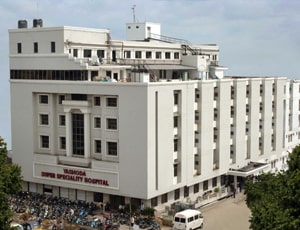
Types of Lung Cancer Treatment in Yashoda Hospital, Malakpet and its associated cost
| Treatment Option | Approximate Cost Range (USD) | Approximate Cost Range (INR) |
|---|---|---|
| Lung Cancer Treatment (Overall) | 6088 - 8145 | 499546 - 665460 |
| Surgery | 4073 - 7104 | 333389 - 583820 |
| Lobectomy | 1516 - 6097 | 125034 - 498966 |
| Pneumonectomy | 2033 - 8158 | 165734 - 663874 |
| Segmentectomy | 1521 - 5085 | 124516 - 414728 |
| Chemotherapy | 808 - 2025 | 66463 - 165991 |
| Targeted Therapy | 1019 - 3051 | 83143 - 249949 |
| Immunotherapy | 1522 - 3563 | 124910 - 292082 |
| Radiation Therapy | 2036 - 4550 | 165981 - 372883 |
| Palliative Care | 507 - 1517 | 41581 - 124264 |
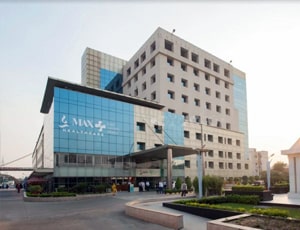
Max Super Specialty Hospital, Vaishali located in Ghaziabad, India is accredited by NABH, NABL. Also listed below are some of the most prominent infrastructural details:
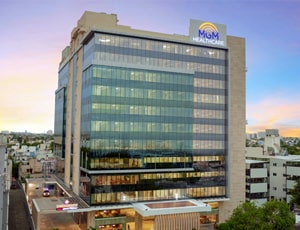
Types of Lung Cancer Treatment in MGM Healthcare and its associated cost
| Treatment Option | Approximate Cost Range (USD) | Approximate Cost Range (INR) |
|---|---|---|
| Lung Cancer Treatment (Overall) | 6112 - 8115 | 499215 - 666716 |
| Surgery | 4075 - 7126 | 333584 - 581187 |
| Lobectomy | 1515 - 6088 | 125270 - 499579 |
| Pneumonectomy | 2033 - 8157 | 166181 - 667251 |
| Segmentectomy | 1516 - 5080 | 124922 - 417112 |
| Chemotherapy | 811 - 2023 | 66654 - 165857 |
| Targeted Therapy | 1017 - 3034 | 83434 - 249103 |
| Immunotherapy | 1527 - 3541 | 125264 - 290584 |
| Radiation Therapy | 2025 - 4584 | 166530 - 374659 |
| Palliative Care | 509 - 1522 | 41717 - 125459 |
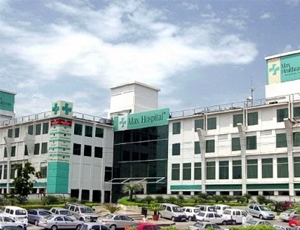
Max Hospital (Gurgaon branch), one of the top medical facilities in India, was established in 2007. Max Gurgaon Hospital is the first multi, super specialty tertiary care in the Location. Out of many other awards, the hospital also possesses the Express Healthcare Awards for Excellence in Healthcare. It is also certified to ISO 9001:2000 standards. The Institute of Minimal Access, Metabolic & Bariatric Surgery at Max Gurgaon has been designated as a Center of Excellence for providing cutting-edge Clinical Services and Surgical Training Programs for Abdominal Wall Hernia Surgery.
Over 5 lakh patients have been treated at the 92-bed Max Hospital Gurugram, which holds expertise in 35 specialized fields such as Cardiac Sciences, Minimal Access, Laparoscopic Surgery, Neurosciences, Urology, Orthopaedics, Aesthetics, Reconstructive Surgery, and Nephrology. The laboratories at Max Healthcare hospitals are accredited by NABH and NABL. It also provides hemodialysis for patients who have end-stage kidney disease and requires renal replacement therapy. Team of doctors and nurses at the hospital provides integrated medical care in a multi-disciplinary setting. As a result, it has received multiple awards and accreditations.
International patients have been treated impeccably here as all the nursing staff, shift doctors, and treating doctors are quite courteous and supportive towards the patients. There is no doubt that being in the hospital can make you feel at home.
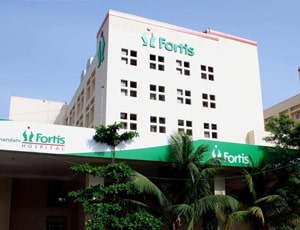
Types of Lung Cancer Treatment in Fortis Hiranandani Hospital and its associated cost
| Treatment Option | Approximate Cost Range (USD) | Approximate Cost Range (INR) |
|---|---|---|
| Lung Cancer Treatment (Overall) | 6117 - 8085 | 501762 - 665606 |
| Surgery | 4054 - 7076 | 333757 - 584748 |
| Lobectomy | 1529 - 6078 | 124369 - 496941 |
| Pneumonectomy | 2027 - 8155 | 166627 - 663422 |
| Segmentectomy | 1524 - 5077 | 125029 - 416036 |
| Chemotherapy | 812 - 2028 | 66527 - 167262 |
| Targeted Therapy | 1012 - 3034 | 83369 - 250110 |
| Immunotherapy | 1528 - 3548 | 125445 - 290302 |
| Radiation Therapy | 2036 - 4550 | 166891 - 372822 |
| Palliative Care | 510 - 1528 | 41494 - 124663 |
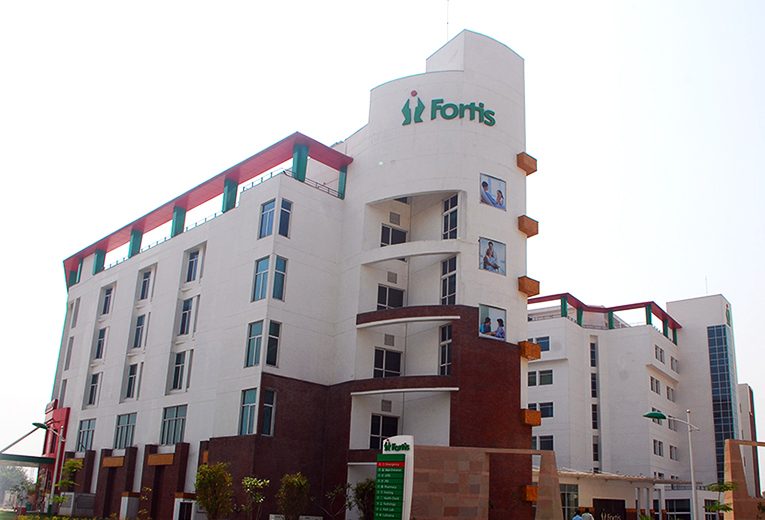
Fortis Hospital, Shalimar Bagh is a super-speciality hospital which occupies a unique place when it comes to providing world class patient care. The hospital is equipped with 262 beds and is expanded over a total area of 7.34 acres. It provides the highest quality of medical care via its team of doctors, technicians, nurses, and management professionals.
Infrastructure & facilities:
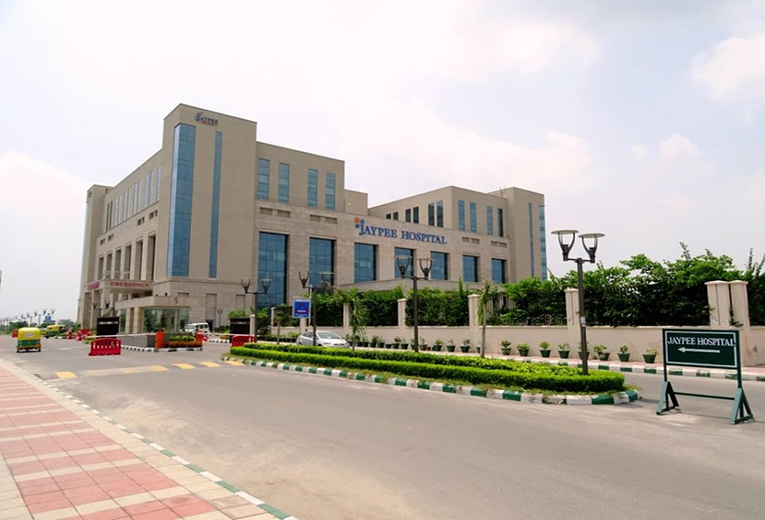
Jaypee Hospital located in Noida, India is accredited by ISO, NABH, NABL. Also listed below are some of the most prominent infrastructural details:
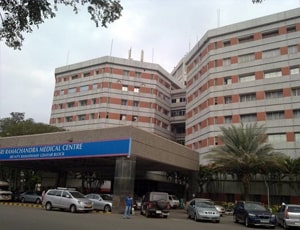
Types of Lung Cancer Treatment in Sri Ramachandra Medical Centre and its associated cost
| Treatment Option | Approximate Cost Range (USD) | Approximate Cost Range (INR) |
|---|---|---|
| Lung Cancer Treatment (Overall) | 6119 - 8138 | 499749 - 666144 |
| Surgery | 4047 - 7128 | 331467 - 581977 |
| Lobectomy | 1519 - 6067 | 124373 - 501709 |
| Pneumonectomy | 2025 - 8097 | 167023 - 664116 |
| Segmentectomy | 1521 - 5053 | 125047 - 414356 |
| Chemotherapy | 813 - 2023 | 66584 - 166146 |
| Targeted Therapy | 1020 - 3037 | 82906 - 250672 |
| Immunotherapy | 1524 - 3558 | 124328 - 290167 |
| Radiation Therapy | 2025 - 4560 | 166299 - 373768 |
| Palliative Care | 508 - 1528 | 41790 - 125394 |
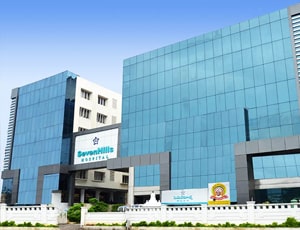
Types of Lung Cancer Treatment in Seven Hills Hospital and its associated cost
| Treatment Option | Approximate Cost Range (USD) | Approximate Cost Range (INR) |
|---|---|---|
| Lung Cancer Treatment (Overall) | 6644 - 9077 | 550948 - 739520 |
| Surgery | 4536 - 7893 | 363715 - 649949 |
| Lobectomy | 1652 - 6798 | 136004 - 551625 |
| Pneumonectomy | 2271 - 8921 | 187912 - 743104 |
| Segmentectomy | 1663 - 5623 | 135537 - 470250 |
| Chemotherapy | 895 - 2262 | 74624 - 187487 |
| Targeted Therapy | 1108 - 3396 | 90432 - 280177 |
| Immunotherapy | 1664 - 4009 | 139890 - 328227 |
| Radiation Therapy | 2283 - 5172 | 183953 - 422285 |
| Palliative Care | 565 - 1701 | 45425 - 141176 |
Aakash Healthcare Super Speciality Hospital located in New Delhi, India is accredited by NABH. Also listed below are some of the most prominent infrastructural details:
Lung cancer is an uncontrolled growth of cells that start off in the lungs. Usually, lung cancer starts in the cells that line the air passages. Instead of developing into healthy lung tissue, the cells divide rapidly and form tumours.
Lung cancer can grow and spread beyond the lung to reach other parts of the body through metastasis. Lung cancers can begin in any part of the lung, but 90 percent of lung cancers begin in the epithelial cells, which are the cells lining the larger and smaller airways also known as bronchi and bronchioles.
This is the reason why lung cancers are sometimes called bronchogenic cancers or bronchogenic carcinomas. Lung cancer is the most common cancer in the world, among both men and women. It is the leading cause of cancer deaths worldwide.
Long-term smoking is the main cause of lung cancer. After smoking, genetic factors and exposure to radon gas, asbestos, second-hand smoke or other forms of air pollution can also increase the risk of lung cancer.
There are two major types of lung cancers, based on the appearance of lung cancer cells under the microscope:
It is necessary to determine the stage of lung cancer by finding out how far cancer has spread, before initiating treatment of lung cancer.
The following are the four lung cancer stages of NSCLC:
After the determination of stage, treatment of lung cancer starts with choosing the best suitable option for the patient. However, there is usually no single treatment for lung cancer. So the patient often receives a combination of therapies and palliative care.
Lung cancer symptoms may vary, depending upon where and how widespread the tumour is. A person with lung cancer may have following lung cancer symptoms:
The treatment of lung cancer may include the following modalities:
Surgery is the best treatment if the lung cancer is in its early stages. In the early stages, it is possible to cure a patient completely by removing the tumor and the nearby lymph nodes. But after cancer has spread, it is nearly impossible to remove all of the cancer cells with the help of surgery.
There are some specific types of surgical procedures for different location and kinds of lung cancers, such as wedge resection of the lung (removal of a portion of one lobe), lobectomy (removal of one lobe), pneumonectomy (removal of an entire lung) and lymphadenectomy (removal of lymph nodes in the region of the lungs). After the surgery, margin tissues are further studied to see if cancer cells are present or not.
Lung cancer surgery is a major surgical procedure that requires hospitalization, general anesthesia, and follow-up care for a few weeks to several months. It also carries side effects like any other surgery, including complications related to bleeding, infection, and general anesthesia.
This treatment uses high-energy X-rays or other types of radiation to destroy or shrink lung cancer tumors. Radiation therapy can be given as a curative therapy, palliative therapy, or as adjuvant therapy combined with surgery or chemotherapy.
Radiation therapy damages the molecules that make up the cancer cells. However, it can damage the normal, healthy tissues. But nowadays improved technology can focus the radiation on precise locations for certain lengths of time, thus reducing the risk of damage to the surrounding healthy tissues.
Chemotherapy is a strong medication treatment, which interferes with the cell division process and damage proteins or DNA to reduce cancer cells. NSCLC and SCLC, both types of lung cancers can be treated with chemotherapy. Chemotherapy might be given in the form of pills, intravenous infusion, or as a combination of both.
However, drugs used in chemotherapy also kill normally dividing cells in the body that may lead to unpleasant side effects. Some of the common side effects of chemotherapy are vomiting, diarrhea, appetite loss, hair loss, fatigue, anemia, infections and more. These side effects may be felt temporarily during treatment, and several drugs exist to help patients cope with the symptoms.
Drugs used in this treatment work by targeting specific abnormalities in the cancer cells. Some of the drugs in this treatment can also strengthen the activity of the immune system against cancer cells. But mostly this treatment only works in people whose cancer cells show certain genetic mutations.
Ask your healthcare adviser for the best multiple options and choose the one that meets your expectations
Lung Cancer Treatment cost in India starts from about USD$ 8500. There are many NABH, JCI certified hospitals in India that offer Lung Cancer Treatment.
Lung Cancer Treatment cost in India varies from one hospital to the other. Some of the best hospitals for Lung Cancer Treatment offer a comprehensive package that covers the end-to-end expenses related to investigations and treatment of the patient. The treatment cost usually includes the expenses related to hospitalization, surgery, nursing, medicines, and anesthesia. Post-surgical complications, new findings and delayed recovery may have an impact on the total Lung Cancer Treatment cost in India.
Lung Cancer Treatment in India is offered by multiple hospitals across the country. The following are some of the most renowned hospitals for Lung Cancer Treatment in India:
After discharge from the hospital, the patient has to stay for another 45 days in the country for complete recovery. During this time, the patient undergoes medical tests and consultations. this is to ensure that the treatment was successful and the patient us safe to return.
India is one of the most popular countries for Lung Cancer Treatment in the world. The country offers the best treatment of Lung Cancer Treatment, best doctors, and advanced hospital infrastructure. Some of the other top destinations for Lung Cancer Treatment include the following:
There are certain expenses additional to the Lung Cancer Treatment cost that the patient may have to pay for. These are the charges for daily meals and hotel stay outside the hospital. The extra charges may vary average around USD$ 25.
Some of the best cities in India which offer Lung Cancer Treatment are:
The patient has to spend about 5 days in the hospital after Lung Cancer Treatment for proper recovery and to get clearance for discharge. The patient is subjected to several biochemistry and radiological scans to see that everything is okay and the recovery is on track. After making sure that patient is clinically stable, discharge is planned.
The overall rating for hospitals providing Lung Cancer Treatment in India is 4.6. Several parameters such as hospital infrastructure, pricing policy, quality of services, politeness of staff etc. contribute to the rating.
There are about 60 hospitals in India that offer Lung Cancer Treatment to international patients. These hospitals have the required expertise as well as infrastructure available to handly patients who need Lung Cancer Treatment
The cost of Lung cancer treatments anywhere in the world is quite high, which becomes unaffordable for many individuals. The treatments offered in countries like the US, the UK, etc.are downright impressive, however, the affordability is difficult if not covered under insurance. On the contrary, lung cancer treatment in India or developing countries like such is comparatively cheaper with uncompromised medical facilities. Apart from that, the multispecialty healthcare units, world-renowned oncologists, competent radiologists, and advanced laboratory testing facilities have made India one of the best choices for cancer treatment.
India offers some of the most advanced approaches to treat lung cancer. However, the types of treatments depend on the type and stage of cancer.
Radiation Therapy: Included among the primary treatments, radiation therapy is further subdivided into external and internal therapies. Where the former uses a radiation beam to penetrate, aim and destroy the malignant cells, the latter uses radioactive metals to kill the cells internally.
Chemotherapy: Over 100 different types of chemical composition, or drugs, are used to treat various types of cancers. In lung cancer treatment, the necessary drug is injected or provided in the form of pills, which when consumed destroy the malignant cells. However, the drugs also destroy normal cells that regrow after certain period.
Targeted Therapy: Candidates are subjected to specific target chemicals or drugs which invade and destroy the abnormal cells. The therapy is very specific and is used for recurring non-small lung cancer cells or cells that are non-responsive to chemotherapy.
Photodynamic Therapy: In this technique, drugs are administered into the body to be absorbed by the cancerous cells. When exposed to high-energy laser or photons, these destroy the drug-soaked cancer cells. However, the treatment offers successful results in the initial stages only.
Thousands of people seek medical attention in India due to the affordable and uncompromised treatments offered. The average cost of lung cancer treatment in the major countries is approximately 5 times higher than that offered in India. However, just like the other places, the lung cancer treatment cost in India varies as per the type of treatment required by the individuals and the stage of cancer. Hence, here is a gist of probable expense according to the type of lung cancer treatment in India:
Radiation therapy: $3000
Chemotherapy: $3000
Wedge Resection: $3000
Pneumonectomy: $5000